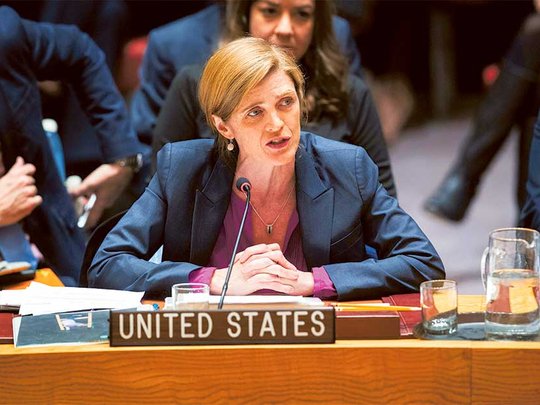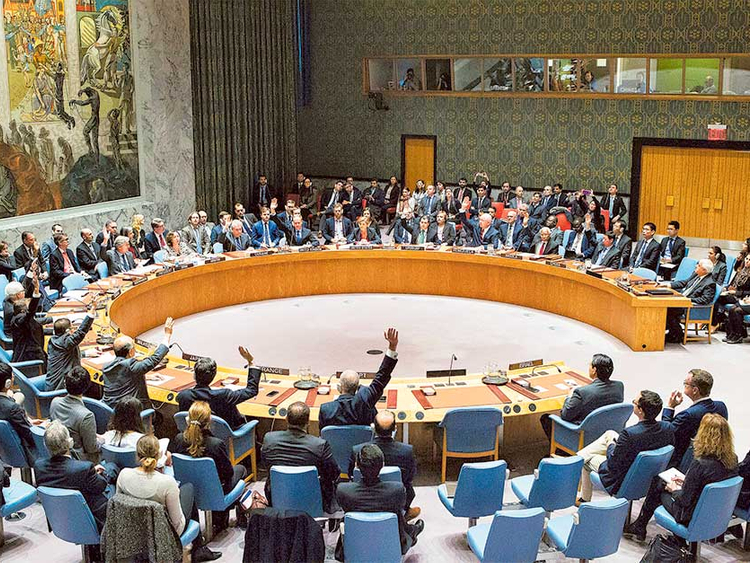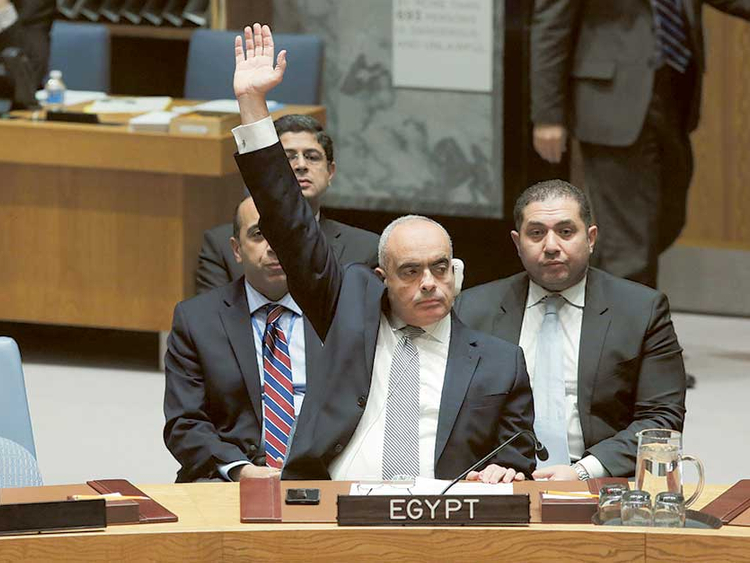
Dubai: The US green light that allowed the UN Security Council to condemn Israeli colonies in the occupied West Bank and occupied east Jerusalem has been widely hailed in the Middle East as a victory due to Washington’s consistent record of vetoing resolutions critical of Israel.
Chief Palestinian negotiator Saeb Erekat hailed the result as a “victory for the justice of the Palestinian cause.” He said Trump’s choice was now between “international legitimacy” or siding with “settlers (colonists) and extremists.”
But, according to Palestinian-American journalist Dina Takrui, it is an ‘absurd’ victory.
“Let’s take a moment to recognise the absurdity of the fact that the passage of a UN resolution that simply calls on Israel to abide by international law is celebrated as a victory...,” she wrote on Facebook.
Israel, has consistently flouted international law and UN resolutions and many think that the fact that America has a responsibility to hold Israel accountable at the very least.
“Even the US is fed up by the Apartheid state’s stealing of land,” Sultan Al Qassemi, an Emirati commentator on Arab affairs, posted on Twitter, in reference to Israel.
America’s abstention has been touted by international media as “controversial” but is it really?
“The notion that colonies are illegal is only controversial with apartheid supporters,” Executive Director at the US Campaign for Palestinian Rights, Yousuf Mounayer wrote on Twitter.
President elect Donald Trump, known for his extremely pro-Israeli stances, was quick to criticise the American vote.
He demanded that Obama veto the resolution and tweeted after the vote, “As to the UN, things will be different after Jan. 20th” - when Trump takes office.
It would be virtually impossible, however, for Trump to overturn the resolution. It would require a new resolution with support from at least nine members in the 15-member Security Council and no veto by one of the other permanent members - Russia, China, Britain or France, all of whom supported Friday’s resolution.
Republicans, who control Congress, immediately threatened consequences. Sen. Lindsay Graham, who heads the Senate panel in charge of US payments to the UN, said he would “form a bipartisan coalition to suspend or significantly reduce” funding. He added that countries receiving US aid could also be penalised for supporting the resolution.
Already Trump has made unprecdented promises in support of Israel by promising to move the US embassy from Tel Aviv to Occupied Jerusalem and to recognise Jerusalem as the capital of Israel, despite the fact that its occupied land.
He also picked David Friedman to be US ambassador to Israel who is known for his far-right views.
Friedman has said in the past that he does not believe colony activity is illegal and opposes a ban on construction in the occupied West Bank and occupied East Jerusalem -- another stance that turns US policy on its head.
Under UN rules, failure to pay dues leads to the loss of voting privileges in the General Assembly.
The Obama administration’s decision to abstain and allow the UN’s most powerful body to approve a long-sought resolution calling Israeli colonies “a flagrant violation under international law” was a sharp rebuke to a longstanding ally and a striking rupture with past US vetoes.
US Ambassador Samantha Power said “it is because this resolution reflects the facts on the ground - and is consistent with US policy across Republican and Democratic administrations throughout the history of the state of Israel - that the United States did not veto it.”
She cited a 1982 statement by then-President Ronald Reagan that the United States “will not support the use of any additional land for the purpose of colonies” and that “colony activity is in no way necessary for the security of Israel.”
The Security Council vote Friday, however, was anything but routine for Washington, which traditionally vetoes all resolutions related to the decades-old Israeli-Palestinian conflict on grounds that differences must be solved through negotiations.
It was the first resolution on the conflict approved during President Barack Obama’s nearly eight years in office and shone a spotlight on his icy relationship with Israeli Prime Minister Benjamin Netanyahu.
The US decision to abstain on the 14-0 vote followed months of intensely secret deliberations in Washington, a spate of fresh Israeli colony announcements that sparked exasperation and anger from American officials, and recent attempts by Israel’s government to have parliament legalise thousands of homes built on privately owned Palestinian land.
After Egypt suddenly postponed a scheduled vote on the resolution Thursday, reportedly under pressure from Israel and supporters of US President-elect Donald Trump, four new sponsors stepped up and pushed it through - Malaysia, New Zealand, Venezuela and Senegal, each representing a different region and reflecting the wide support for the measure.
Mohammad Anwar Al Sadat, an Egyptian lawmaker, demanded an urgent explanation as to why Egyptian foreign minister Sameh Shokri, moved to postpone the vote.
“The disappointing Egyptian stance at the UN Security Council needs to be explained to the Palestinians and the entire Arab world,” he said, adding that it gave a bad image about Egypt and its attitudes.”
The vote on colonies sparked behind-the-scenes discussion in the usually divided Security Council on what else might be achieved on the Israeli-Palestinian issue while Obama is still in the White House.
New Zealand has been pressing for the council to consider a resolution that would set out the parameters for a settlement of the conflict, and its draft ideas remain on the table.
Israeli Prime Minister Benjamin Netanyahu immediately retaliated against some of the nations that proposed Friday’s resolution. He recalled his nation’s ambassadors to New Zealand and Senegal for consultations, canceled a planned January visit to Israel by Senegal’s foreign minister and ended Israeli aid programs to the West African nation.
“Israel rejects this shameful anti-Israel resolution at the UN and will not abide by its terms,” Netanyahu’s office said in a statement.
The Israeli leader blamed Obama for failing to “protect Israel against this gang-up at the UN” and even colluding with its detractors. He said, “Israel looks forward to working with President-elect Trump and with all our friends in Congress, Republicans and Democrats alike, to negate the harmful effects of this absurd resolution.”
Palestinian officials were quick to cast the abstention as a victory, as they face an increasingly frustrated populace that has become disillusioned with their own government.
Yousuf Al Mahmoud, Palestinian government spokesman described the move as a “serious slap in the face” for Israel.
Jordan’s government spokesman, Mohammad Al Momami, said the resolution was “historic”.
“The resolution highlights the Palestinian historic and undisputed basic rights in occupied East Jerusalem and Historical Palestine,”he said.
Saeb Erekat, the Undersecretary of the Palestine Liberation Organization (PLO) said “the resolution is a victory for the international legitimacy and relative laws sending a clear message to Israel that the world will never recognise facts on the ground,” he said, in reference to Israel’s attempts to change facts on the ground.
The vote comes against the backdrop of growing violence in the Palestinian territories in response to an uptick in Jewish raids on Al Haram Al Sharif. Israel has been imposing restrictions on Palestinians from accessing the Muslim site—the third holiest in Islam— to pave the way for more colonists to raid the holy shrine and perform their Jewish and Talmudic rituals inside the holy site.
Under a status quo agreement, Jews may visit Al Haram Al Sharif, but may not perform religious rituals there.
Israel has also banned Palestinians from burying their dead in specific parts of Bab Al Rahma cemetery, a resting place for many of the city’s historic figures.
Israel has also removed Arabic signage from many streets in Occupied Jerusalem replacing them instead with Hebrew signs in an attempt to Judaise the city and erase any Palestinian or Muslim identity.
Israel continues to build illegal colonies on Palestinian land, routinely demolishes Palestinian homes and carries out extrajudicial killings of Palestinians with little or no reproachment from Washington.
The US dedicates nearly one-fifth of its entire US foreign aid budget to Israel. Israel receives about $3b in direct foreign assistance each year amounting to nearly $10.2m each day.
-With inputs from AP














